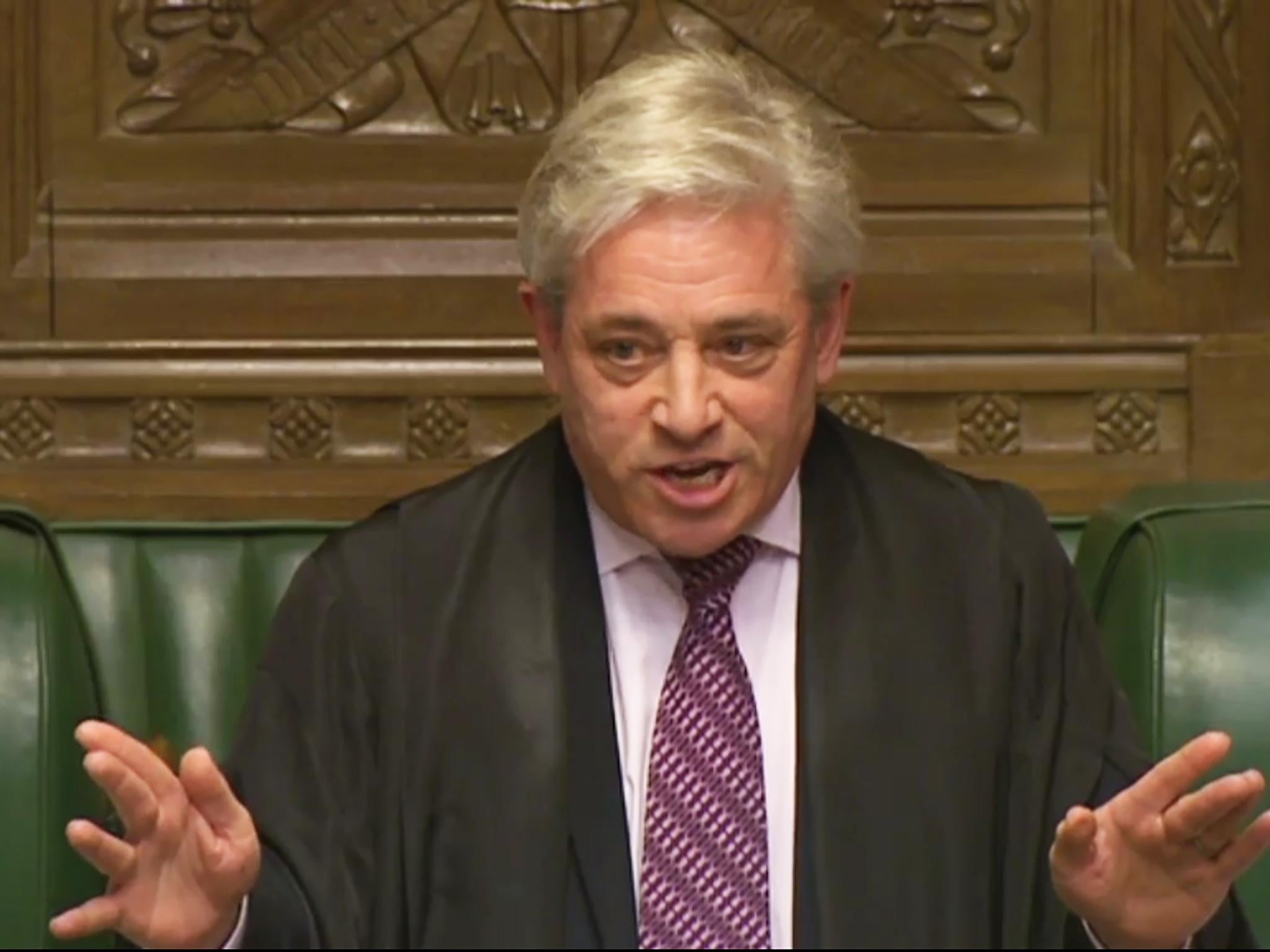As Brexit looms, the speaker of the house will need to be beyond reproach
While maintaining the strict convention that matters regarding the speakership are matter for the Commons and the Commons alone, that has not prevented the prime minister from letting it be known that she does not like what she is hearing

Your support helps us to tell the story
From reproductive rights to climate change to Big Tech, The Independent is on the ground when the story is developing. Whether it's investigating the financials of Elon Musk's pro-Trump PAC or producing our latest documentary, 'The A Word', which shines a light on the American women fighting for reproductive rights, we know how important it is to parse out the facts from the messaging.
At such a critical moment in US history, we need reporters on the ground. Your donation allows us to keep sending journalists to speak to both sides of the story.
The Independent is trusted by Americans across the entire political spectrum. And unlike many other quality news outlets, we choose not to lock Americans out of our reporting and analysis with paywalls. We believe quality journalism should be available to everyone, paid for by those who can afford it.
Your support makes all the difference.When Michael Martin, who died recently, was forced out of his post as speaker of the House of Commons in 2009, he was the first to be so treated, in effect, since 1695. At that point, when Speaker Bercow took over, many would have thought that the speakership would not again be placed in such uncertainty again for some time, if not the full three centuries.
It seems perhaps not. The allegations against the behaviour of Speaker Bercow are growing. They remain, it must be stressed, allegations. Some, such as allegations of bullying, tantrums and mockery of staff have been judged insufficiently grave to be pursued by the independent Commissioner for Standards.
Now, following close on, we have some fresh ones, overheard by an MP, of allegedly sexist remarks about the leader of the House of Commons, Andrea Leadsom; “stupid woman” the speaker is alleged to have muttered. Some other, still less obliging and earthier epithets about the right honourable member for South Northamptonshire, were said to have followed.
What is novel about these rounds of misgivings about Speaker Bercow are the intentions of the prime ministerial spokes team. While maintaining the strict convention that matters regarding the speakership are matter for the Commons and the Commons alone, that has not prevented the prime minister from letting it be known that she does not like what she is hearing, and, like it or not, she is an MP with a disproportionate degree of influence.
The prime minister’s official spokeswoman has told the media that May believes that if the words had been used, they are “unacceptable” and should be investigated. That is quite a steer. They added, by way of faint praise: “She has confidence in the work that he is currently doing.”
As if tacitly admitting the offence, the speaker’s office responded: “Wednesday was an unusual and controversial day in how business was handled in the house by the government and some strong and differing views were expressed on all sides on the subject. The speaker treats his colleagues with respect and strives at every turn to facilitate the House of Commons.”
Not quite a denial, then.
There are two truths about the speakership, one abiding, one more rapidly changing. The immutable truth is that speakers, if they are doing their jobs, will constantly be the subject of resentment by the executive, because they protect the rights of opposition parties, especially the smaller ones, and individual members with unusual opinions. That is as true as it has ever been, and, insofar as his partisanship is concerned, the overwhelming majority of mutterings against Speaker Bercow have emanated from the government and pro-Brexit, side of the house, albeit among backbenches as well as the front bench. The disquiet does not appear universal; the house, in other words, needs to think carefully about unseating a speaker, for fear of weakening the office itself.
The more flexible convention would seem to be that the speaker is usually above any criticism and extremely difficult to attack. The fate of Speaker Martin seems to have broken some of that spell, and the house is much less happy to tolerate a speaker who is not performing to the peak of the Commons’ expectations. In the past there have been numerous instances of speakers too tired and emotional to fulfil their responsibilities properly, but were nonetheless indulged until a natural point for retirement was reached.
Today, as we approach the traumas of Brexit, the speakership is as important as ever.
There will be tight votes and difficult decisions to be made. The speaker must command the respect and confidence of the House; he must also, however, be above and beyond approach when it comes to sexism as much as political bias. It might be as well, in fact, for the speaker to give a fuller and more detailed account of his recent remarks about Ms Leadsom, and act with grace if his words were found to fall below the standard expected. He need not, on other words, have to quit at such a crucial moment; but it might be helpful if he was to update honourable members on his intentions about retirement. More than that, Mr Bercow is obliged to mend ways that may need to be mended, and, indeed to follow the advice he often offers to his more excitable charges: “For goodness sake, calm down.”
Join our commenting forum
Join thought-provoking conversations, follow other Independent readers and see their replies
Comments